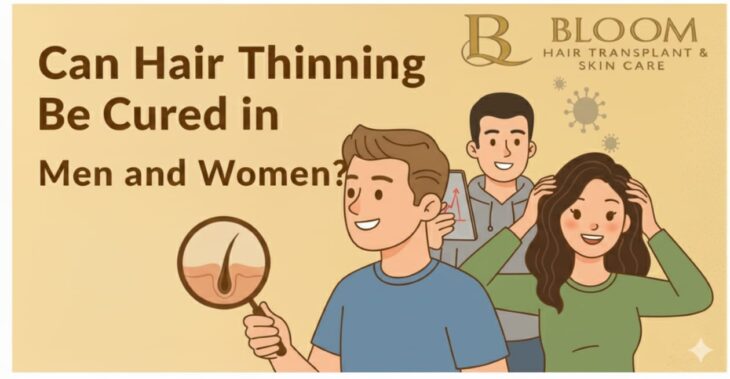
Can Hair Thinning Be Cured in Men and Women?
Hair is deeply tied to self-confidence and personal identity, which is why thinning hair often feels distressing. Both men and women experience hair thinning for different reasons, ranging from genetics and hormonal changes to stress, diet, and medical conditions. The big question people often ask is: can hair thinning be cured? Or, more specifically, can thinning hair be fixed with the right treatment and care?
Clinics like Bloom Hair Transplant Clinic specialise in advanced solutions, from medical treatments to surgical hair restoration – helping individuals regain thicker, healthier hair and renewed confidence.
This blog explores the causes of hair thinning, available treatments, and realistic expectations for men and women seeking to restore their hair health.
Why Does Hair Thinning Happen?
Before answering whether hair thinning can be cured, it’s important to understand why it happens in the first place.
Common Causes in Men
- Genetics (Male Pattern Baldness): The most common reason is androgenetic alopecia, also known as male pattern baldness. It’s linked to genetics and sensitivity to the hormone DHT.
- Lifestyle Factors: Smoking, poor nutrition, and high stress can accelerate hair thinning.
- Medical Conditions: Issues such as thyroid imbalance, scalp infections, or autoimmune conditions may contribute.
Common Causes in Women
- Hormonal Changes: Pregnancy, menopause, or polycystic ovary syndrome (PCOS) can trigger hair thinning.
- Nutrient Deficiencies: Lack of iron, vitamin D, or protein may lead to shedding.
- Hairstyling Practices: Excessive heat styling, tight hairstyles, and harsh chemicals can weaken hair.
For both genders, early identification of the root cause is crucial to determining whether thinning hair can be fixed effectively.
Can Hair Thinning Be Cured Completely?
The short answer is: it depends. Some types of hair thinning can be reversed, while others can only be managed or slowed down.
- Genetic Hair Loss: Unfortunately, when hair thinning is caused by genetics (male or female pattern baldness), it cannot be completely cured. However, treatments exist to slow down the process and even regrow hair in some cases.
- Temporary Hair Loss: If hair thinning is due to stress, poor diet, illness, or medication, then yes, thinning hair can be fixed once the underlying cause is addressed.
So, while not all hair thinning can be cured permanently, many cases can be improved with the right approach.
Treatments and Solutions for Hair Thinning
1. Medical Treatments
- Minoxidil (Rogaine): A topical solution or foam approved for both men and women. It helps stimulate hair follicles and can slow thinning.
- Finasteride (Propecia): A prescription pill for men that reduces DHT levels, slowing male pattern baldness.
- Hormonal Therapy: For women, treatments that balance hormones (such as birth control pills or anti-androgens) may help.
2. Clinical Procedures
- PRP Therapy (Platelet-Rich Plasma): Uses platelets from your blood injected into the scalp to promote hair growth.
- Low-Level Laser Therapy (LLLT): Stimulates follicles with red light technology.
- Hair Transplant Surgery: A permanent solution where healthy follicles are transplanted to thinning areas.
3. Lifestyle and Natural Remedies
- Balanced Nutrition: Protein, iron, biotin, and omega-3 fatty acids are essential for healthy hair.
- Stress Management: Yoga, meditation, and good sleep can reduce stress-induced hair loss.
- Gentle Hair Care: Avoid harsh chemicals, heat styling, and tight hairstyles that damage follicles.
While these methods may not provide a complete “cure,” they can significantly improve hair thickness and slow down progression.
Differences in Treating Men vs. Women
When discussing whether hair thinning can be cured, gender plays a role:
- Men often respond well to finasteride and minoxidil, with many able to slow or reverse early-stage thinning.
- Women have more complex hormonal influences, so treatments focus on balancing hormones, improving nutrition, and using topical therapies.
Because women’s hair thinning is often more diffuse (spread across the scalp rather than in defined patterns), surgical options like transplants may need different strategies compared to men.
Setting Realistic Expectations
It’s essential to understand that while thinning hair can be fixed in many cases, “cure” doesn’t always mean regaining a full head of thick hair. For genetic conditions, the goal is usually to manage, slow, or partially restore hair. For temporary conditions, full recovery is often possible once the underlying cause is treated.
Think of it as a spectrum: some people see dramatic regrowth, while others experience stabilisation of hair loss. Consistency in treatment and patience are key; results often take months to become visible.
Finding the Right Path to Hair Recovery
So, can hair thinning be cured in men and women? The honest answer is that it depends on the cause. If it’s genetic, it can be managed but not completely cured. If it’s due to lifestyle, stress, or nutrient deficiencies, then yes, thinning hair can be fixed with the right changes and treatments.
The best approach is early intervention – consulting a dermatologist, trichologist, or a trusted clinic like Bloom Hair Transplant Clinic as soon as thinning is noticed. With today’s advanced solutions, hair thinning doesn’t have to be permanent, and with the right care, both men and women can enjoy healthier, fuller hair.

